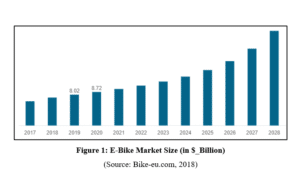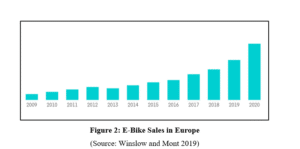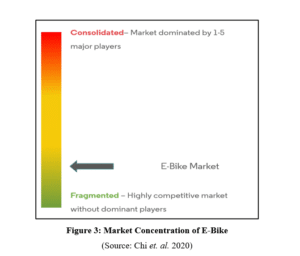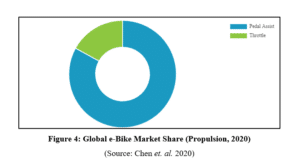ECO9023M Marketing Conditions Assignment Sample
Get the best sample idea on ECO9023M Marketing Conditions Assignment, written by the expert.
Executive Summary
This study has focused on business economics, which has ensured a high level of sustainability in the surrounding environment. Regarding this aspect, the topic has chosen related to electric bicycles in the global market. In this way, a lot of relevant things have been discussed adequately. Both supplies and demanding factors in favour of increasing the use of e-bikes have been discussed. Then, why the rate of the use of e-bicycles has been rising in the UK rather than Germany has also been discussed with plausible findings and recent statistics. Apart from this, the core impact of the reduction of VAT rates proposal in this segment has also been emphasized.
Introduction
The term ‘Business Economics’ has been referred to as a field of applied economics, which has investigated financial, organizational, market-oriented, and environmental issues and challenges faced by corporations. It has also encompassed key subject matters like scarcity concept, product factors, distribution, and consumption by customers (Yin et. al. 2018). Throughout this current study, demand and supply factors of electric bicycles in the 21st century have been discussed with key factors. Between the UK and Germany, the use of e-Bikes has also been compared with tax reduction implications and other kinds of determining factors altogether. With relevant data, statistics, and diagrams, the whole concept has been understood.
Demand and Supply factors leading to an increase of using Electric Bicycles
Electric Bicycles have been considered as a kind of bicycle with an integrated electric motor-driven mechanism along with a battery. It has produced power causing or assisting propulsion. There are numerous globally available e-bikes with a small motor, which must assist the pedal-power of the rider to more powerful e-bikes that also produce sufficient power towards a completely driven bike using the throttle.
Now, as per latest statistics, it has been seen that the rate of global electric bicycle market has been valued at $40,312 million as of 2019, which is also projected to reach around $118,657 million as of 2030. In addition to this, it has also been forecasted that this industry should also register a CAGR of 10.5% from 2020 to 2030 at the same point (Bike-eu.com, 2018). Therefore, it has also been said that there are both supplies as well as demand factors, which have been leading towards such rapid growth of the use of e-bikes. Those have been demonstrated with diagrams and examples as follows:
Connectivity Solutions as Latest Trends

In this case, it has been identified that a range of connectivity applications such as V2X (i.e. vehicle to everything) must deliver more production. It has also ensured that drivers are also being alerted in any case of further risk at the time of driving. That is why most e-bike manufacturers have started to develop a bicycle-to-vehicle (B2V) communication standard on behalf of SAE Industry Technology (Zheng et. al. 2019). For example, a range of manufacturers like Subaru, GM, Ford, and others have focused on this technology with different kinds of prototypes. In one word, the high level of connectivity solutions presented in e-bike must influence customers to positively direct industry growth in the future.
Health Awareness of using E-Bikes
This factor or a range of health benefits should replace commuting via cars with a Class 1 e-bike. This is because; compared to driving a car, traveling through an e-bike is more convenient and easy, as it has helped a lot to contributors for improving blood sugar control, cardiovascular endurance, physical activity recommendations, and others with a diverse range of positive outcomes and benefits (Winslow and Mont 2019). In one word, this major factor is also estimated to drive the whole market scenario of the industry for electric mopeds

Adoption of Shared Micro-mobility to Augmented Growth
This factor has shown that micro-mobility has become a core part of the whole public transportation ecosystem. Hence, as a flexible transportation medium, e-bikers should deliver low means of operational costs along with a range of overhead facilities. That specifically means through shared micro-mobility options, can complement higher-volume fixed-route transit services by delivering mobility services for many years on many trips at a low-cost approach (Chi et. al. 2020). As per latest report and statistics, it has also been found that a range of North Americans has taken an estimated 83.4 million trips on shared micro-mobility vehicles as of 2020 rather than 2019 with the help of e-bikes. In this case, a range of e-bikes options like scooters, pedal bikes, and others have helped to make around 7 to 10 million trips per annum with enhanced market growth.

High Purchase Cost
In the field of restraining factors, mainly due to the high rate of purchase costs, most passengers or commuters have chosen e-bikes as their preference. This adoption has remained limited on a larger scale due in part to high purchase costs. As of 2019, it has been found that the number of electric moped owners in North America has cost around $2,600 to purchase. From an in-detailed comparison, a mountain moped has an average cost of $620, whereas other bikers or cars have cost more with the same capacity (Theguardian.com, 2021). However, due to the high ownership cost associated with e-bikes, it might hamper the market sales globally in the period of forecasting.

Factors determining the number of E-Bicycle users of the UK catching up Germany
In this specific segment of the current study, it has been emphasized that the UK has tried a lot to catch Germany’s e-Bike market and its sector with a range of determining factors. Regarding this matter, it has also been identified that most cycling brands have geared up for ensuring rapid growth in the UK Cargo bike market. As stated by Patel and Patel (2020), sales have also been forecasted to soar over in upcoming years with the support of many government initiatives as well as new infrastructure. As per latest statistics, it has also been found that in the UK market, around a total of 2,000 cargo bikes were sold last year only for commercial use purposes as reported by the Bicycle Association in the same country. Apart from that, it has also been expected that this sale of e-bikes might jump by up 60% in the UK in next year as per that association boosted by a range of initiatives. Moreover, such rapid growth of e-bikes must help a lot in terms of ensuring low carbon impact in the environment with low emissions and congestion thereafter.
On the other hand, in the same context, Raleigh, a recognized globally acknowledged bike brand has estimated that this market will soar up to 15 times higher in the next five (5) years. Henceforth, it has also started to sell and manufacture various types of cargo bikes, which makes the sales spike with a 75% hike last year. However, in contrast to this matter, in Germany, it has been seen that around a total of 100,000 cargo bikes are sold every year, whereas, in France, there have sold around 50,000 per annum compared to the UK market thereafter (Guidon et. al. 2019). In one word, it is important to say that for getting rid of pollution and congestion in the environment, the emergence of e-bike has been highly prioritized with a lot of benefits and desired outcomes.
Implications of reduction of Value Added Tax in the UK for E-Bike market
In this specific context of the current study, it has been highlighted that due to this high rise of the use of e-bikes across the globe, the UK’s total number of value-added tax (VAT) has also been reduced at the same time. Therefore, it can also be said that for the electric bike market in the UK, this VAT reduction has ensured a lot of implications in the core market segment. In detail, as per latest reports of the European Commission, the reform of the VAT system has been considered. Hence, as per maintaining this proposal, member states have been able to set reduced or zero VAT rates in the field of electric bicycles market (Newson and Sloman 2019). Regarding this fact, the ECF, as well as CONEBI, have stated that the use and sale of e-Bikes should be categorized under alternative transport choices that help to save oil, gas, fossil fuels, and other kinds of non-renewable energy sources. In this way, the standard VAT rate should be capped at least 15% with a lot of benefits.
On the other hand, it has also been highly embraced that due to this reduction of VAT rates in this field, some positive initiatives have also been highlighted with the key purpose of using e-Bikes in the future. As a serious concern, it has been realized that through extensive usage of e-Bikes, it becomes possible to avail both social as well as environmental benefits with desired outcomes (Bigazzi and Wong 2020). Thus, as a sustainable mode of transport, this system should be induced in the whole environment of the country. However, this VAT reduction proposal has also threatened to undercut members of the state’s various initiatives, which boost this usage at the same time.
Conclusion
From that upper in-detailed discussion, it can be concluded that in this modern era of globalization, the need and priority of sustainability has been increasing with emergence and growth. For this specific reason, to reduce the level of harmful and hazardous negative impact on the surrounding environment, the use of e-bikes has been rising gradually. Concerning this fact, it has also been assumed that some demand as well as supply factors including health awareness, high cost of cars and other vehicles, connectivity solutions, and the rise of shared micro-mobility aspect have helped to boost this industry with a lot of benefits and business opportunities. However, in the UK, rather than Germany, the VAT reduction proposal has also impacted the whole industrial environment more with a range of effects at the same point.
References
Bigazzi, A. and Wong, K., (2020). Electric bicycle mode substitution for driving, public transit, conventional cycling, and walking. Transportation research part D: transport and environment, 85, p.102412.
Bike-eu.com, (2018), EU VAT Reform Excludes E-Bikes from Reduced or Zero Tax, Available at: https://www.bike-eu.com/laws-regulations/nieuws/2018/10/eu-vat-reform-excludes-e-bikes-from-reduced-or-zero-tax-10134673 [Accessed on 7th January 2022]
Chen, Z., Hu, Y., Li, J. and Wu, X., (2020). Optimal deployment of electric bicycle sharing stations: model formulation and solution technique. Networks and Spatial Economics, 20(1), pp.99-136.
Chi, M., George, J.F., Huang, R. and Wang, P., (2020). Unraveling sustainable behaviors in the sharing economy: An empirical study of bicycle-sharing in China. Journal of Cleaner Production, 260, p.120962.
Guidon, S., Becker, H., Dediu, H. and Axhausen, K.W., (2019). Electric bicycle-sharing: a new competitor in the urban transportation market? An empirical analysis of transaction data. Transportation research record, 2673(4), pp.15-26.
Newson, C. and Sloman, L., (2019). The Case for a UK Incentive for E-bikes. London: Bicycle Association.
Patel, S.J. and Patel, C.R., (2020). A stakeholders perspective on improving barriers in implementation of public bicycle sharing system (PBSS). Transportation research part A: policy and practice, 138, pp.353-366.
Theguardian.com, (2021), Cycling brands gear up for rapid growth in UK cargo bike market, Available at: https://www.theguardian.com/business/2021/jul/24/cycling-brands-gear-up-for-rapid-growth-in-uk-cargo-bike-market [Accessed on 7th January 2022]
Winslow, J. and Mont, O., (2019). Bicycle sharing: Sustainable value creation and institutionalisation strategies in Barcelona. Sustainability, 11(3), p.728.
Yin, J., Qian, L. and Singhapakdi, A., (2018). Sharing sustainability: How values and ethics matter in consumers’ adoption of public bicycle-sharing scheme. Journal of Business Ethics, 149(2), pp.313-332.
Zheng, F., Gu, F., Zhang, W. and Guo, J., (2019). Is bicycle sharing an environmental practice? Evidence from a life cycle assessment based on behavioral surveys. Sustainability, 11(6), p.1550.
________________________________________________________________________________
Know more about UniqueSubmission’s other writing services:

